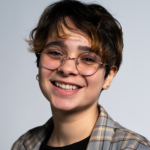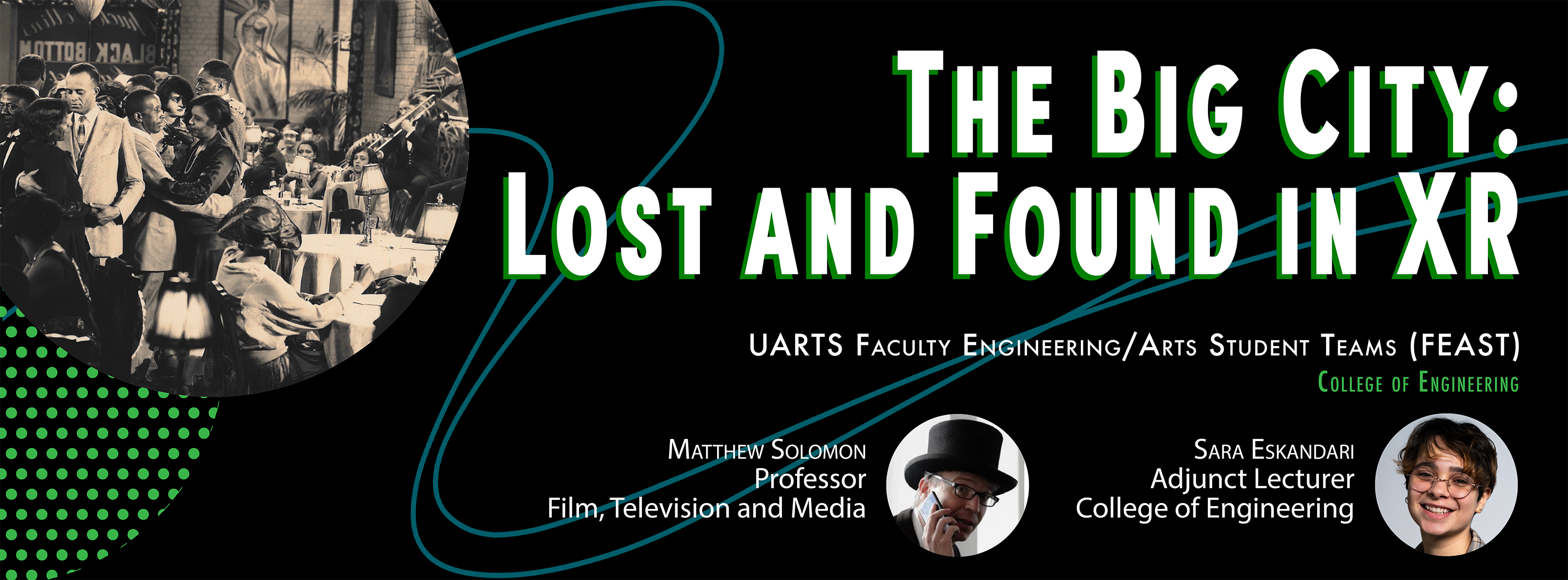Students will experience working in a small game development team to create a high-fidelity, historical recreation of the sets using 3D modeling, 2D texturing skills, level design, and game development pipelines. They will experience a unique media pipeline of game design for live performance and cutting-edge virtual production.
This project will also dedicate focus towards detailed documentation in order to honor the preservation of THE BIG CITY that allows us to attempt this endeavor and the black history that fuels it.
Film Specialist (1 Student)
This student will be researching the film techniques of the scene, and working with 3D modelers to translate film sets to 3D models and video game level designs. May direct camera operating once in the video studio. Research, coordinating with acting and costuming teams.
Likely Majors/Minors: FTVM
2D Artists (1-2 Students)
Collaborating with 3D artists to design and texture the environment, props, and characters. Potentially will be storyboarding to reimagine the scenes as well or designing costumes based off of photographs
Preferred Skills: Photoshop and drawing skills.
Likely Majors/Minors: ARCH, ARTDES, THTREMUS, FTVM
3D Artists (2-3 Students)
3D modeling of the props, environment, and characters. Assisting with Level designing and material creation within Unreal Engine.
Likely Majors/Minors: ARCH, ARTDES, CS, CSE
Game Developer (1 Student)
Must be comfortable with Unreal Engine and navigating 3D design space. Level designing and working within component systems to configure virtual production scenes and animate through blueprints.
Preferred Skills: Unreal Engine, Programming knowledge is a plus but not necessary.
Likely Majors/Minors: CS, CSE, EECS
Faculty Project Leads

Matthew Solomon teaches film history and theory, about which he has published widely in several languages. He is interested in cinema’s relations to the popular and performing arts and has written numerous articles and book chapters about topics ranging from the origins of moving pictures to radio drama and Hollywood films of the 1940s.
He is the author of Disappearing Tricks: Silent Film, Houdini, and the New Magic of the Twentieth Century, winner of the Kraszna-Krausz award for best moving image book, of a monograph on Chaplin’s The Gold Rush for the BFI Film Classics series, and, most recently, of Méliès Boots: Footwear and Film Manufacturing in Second Industrial Revolution Paris.
He is the editor of Fantastic Voyages of the Cinematic Imagination: Georges Méliès’s Trip to the Moon and of the late Madeleine Malthête-Méliès’ Magnificent Méliès: The Authorized Biography, translated by Kel Pero. He co-edits the “Cinema Cultures in Contact” book series for the University of California Press and the “Out of the Archives” book series for the University of Michigan Press.

Sara “Dari” Eskandari is an extended reality software developer with the DMC-CAEN Emerging Technologies Group, specializing in developing VR/AR/MR apps for research, medical, and educational use. Graduated from University of Michigan’s STAMPS School of Art & Design with a minor in Computer Science, Dari has spent time working as a programmer for games such as Heart Shaped Games’s We are the Caretakers, and lead artist for Chess Heroes Inc’s Chess Heroes and 3615 Theatre’s Dark City.
A passionate interdisciplinary developer and designer, Dari works to increase the accessibility of new technologies to their students while discussing the rapid and undulating effects of immersive technologies on daily life and entrepreneurial pursuits including products, pitches, and production pipelines.
Within their university appointments they serve as a member on the DMC DEI-Committee, staff advisor for the Digipaint Club, pilot for the guest lecturer exchange with the University of Illinois-Chicago Biomedical Visualization Graduate program to expand XR cross-campus collaboration, and adjunct lecturer for Living ArtsEngine’s creative collaborative project course, Introduction to the Creative Process.
Students: 7
Likely Majors/Minors: ARCH, ARTDES, CS, CSE, EECS, FTVM, THTREMUS
Meeting Details: Wednesdays, 3 pm (Hybrid)
Application: Consider including a link to your portfolio or other websites in the personal statement portion of your application to share work you would like considered as part of your submission.
Summer Opportunity: Summer research fellowships may be available for qualifying students.
Citizenship Requirements: This project is open to all students on campus.
IP/NDA: Students who successfully match to this project team will be required to sign an Intellectual Property (IP) Agreement prior to participation.
Course Substitutions: CoE Honors

